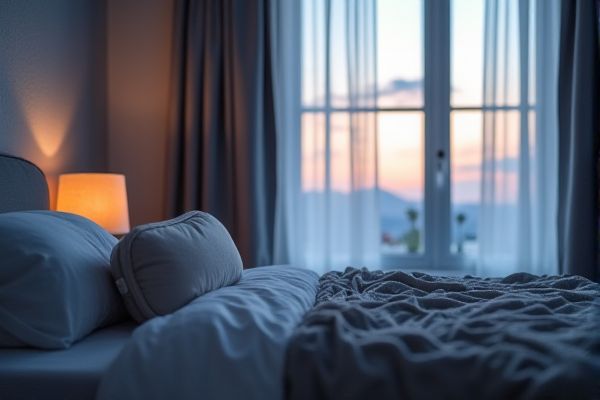
Sleep masks provide a portable, cost-effective solution for blocking light directly over your eyes, ensuring immediate darkness regardless of room conditions. For a comprehensive understanding of which option suits your sleep environment best, continue reading this article.
Table of Comparison
| Feature | Sleep Mask | Blackout Curtains |
|---|---|---|
| Purpose | Block light directly on eyes | Block light entering a room |
| Light Blocking Efficiency | High - covers eyes completely | Very High - blocks most external light |
| Comfort | May cause pressure on eyes | No physical contact, comfortable |
| Portability | Compact, travel-friendly | Fixed installation, not portable |
| Cost | Low to moderate price | Moderate to high price |
| Installation | No installation required | Requires curtain rod and mounting |
| Use Cases | Travel, naps, shift work | Bedrooms, home theaters, nurseries |
| Durability | Moderate lifespan | Long-lasting material |
Introduction to Sleep Masks and Blackout Curtains
Sleep masks and blackout curtains both serve to enhance your sleep quality by blocking out light, but they function differently in design and application. Sleep masks are lightweight, portable, and provide a direct shield over your eyes, ideal for travel or irregular sleep environments. Blackout curtains cover entire windows, offering a room-wide darkening effect and additional insulation benefits, making them suitable for consistent home use.
How Sleep Masks Work
Sleep masks work by creating a physical barrier that blocks light directly from reaching your eyes, which signals your brain to produce melatonin, the sleep hormone. Unlike blackout curtains that cover windows and reduce overall room light, sleep masks provide a portable and personal solution to ensure complete darkness regardless of your environment. Your ability to fall asleep faster and experience deeper rest can significantly improve when using an effective sleep mask to optimize darkness.
How Blackout Curtains Function
Blackout curtains function by using dense, tightly woven fabrics that block out external light, creating a dark environment ideal for improving sleep quality. Unlike sleep masks that cover only your eyes, blackout curtains prevent light from entering the entire room, reducing glare and maintaining consistent darkness throughout. Your choice between the two depends on whether you prefer localized darkness directly on your eyes or complete room darkening for enhanced sleep comfort.
Light Blocking Effectiveness Compared
Sleep masks provide targeted light blocking by conforming to the contours of your face, effectively eliminating light exposure to your eyes. Blackout curtains cover entire windows, blocking external light sources from entering the room and creating a darker environment overall. For complete darkness, combining both sleep masks and blackout curtains ensures maximum light blocking effectiveness, improving sleep quality.
Comfort and Convenience
Sleep masks offer personalized comfort by blocking light directly on the eyes without affecting room temperature or airflow, making them ideal for travel or shared spaces. Blackout curtains provide comprehensive darkness by covering entire windows, enhancing room insulation and reducing noise but may be less convenient to install or adjust frequently. Selecting between the two depends on individual preferences for ease of use and desired coverage during sleep.
Portability and Travel Use
Sleep masks excel in portability and travel use due to their compact, lightweight design that easily fits into luggage or carry-ons, providing immediate darkness anywhere. Blackout curtains, while highly effective at blocking light, are bulky, require installation, and are impractical for travel purposes. Travelers seeking convenience and effective light control typically prefer sleep masks for their ease of use on planes, trains, and hotel rooms.
Health and Sleep Quality Benefits
Sleep masks provide targeted light blockage, improving melatonin production and enhancing deep sleep phases, which directly supports better health and cognitive function. Blackout curtains create a consistent dark environment by eliminating ambient light in the entire room, helping regulate circadian rhythms and reducing sleep disturbances. You can choose based on your specific sleep environment needs to maximize restorative rest and overall well-being.
Installation and Maintenance
Sleep masks require minimal installation, simply needing to be placed comfortably over the eyes each night, while blackout curtains demand mounting hardware and precise measurements for effective light blocking. Maintenance for sleep masks involves regular washing to maintain hygiene, often recommended after several uses; blackout curtains require periodic laundering or vacuuming to remove dust and maintain fabric integrity. Both options offer convenience, but sleep masks excel in portability and ease of cleaning, whereas blackout curtains provide a stationary, no-fuss blackout solution once installed.
Cost Comparison
Sleep masks generally cost between $5 and $30, offering an affordable solution for blocking light during sleep. Blackout curtains typically range from $20 to $100 or more, representing a higher initial investment but providing full-room light control and added insulation. Your choice depends on budget and whether you need targeted light blocking or a comprehensive room darkening solution.
Which Option Is Right for You?
Choosing between a sleep mask and blackout curtains depends on your lifestyle and sleep environment. Sleep masks provide a portable, cost-effective solution for blocking light during travel or irregular schedules, while blackout curtains offer a permanent, hassle-free way to darken your bedroom and reduce external noise. Your decision should consider convenience, room aesthetics, and light sensitivity to optimize your sleep quality.
 homyna.com
homyna.com